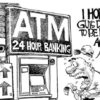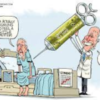Brits face sharpest fall in living standards on record as government tightens its belt
![]()
Brits face sharpest fall in living standards on record as government tightens its belt
PUBLISHED FRI, NOV 18 20227:07 AM ESTUPDATED FRI, NOV 18 20227:27 AM EST
SHAREShare Article via FacebookShare Article via TwitterShare Article via LinkedInShare Article via Email
KEY POINTS
- Alongside confirmation that the country has entered a recession and GDP will contract by 1.4% in 2023, the Office for Budget Responsibility (OBR) on Thursday estimated that real household disposable income — a measure of living standards — is projected to fall by 4.3% in 2022-23.
- The cumulative decline of 7.1% between 2021-22 and 2023-24 would reduce RHDI to its lowest point since 2013-14, erasing eight years of growth.

Prime Minister Rishi Sunak (C), alongside the Chancellor of the Exchequer, Jeremy Hunt, (centre right) holds his first Cabinet meeting on October 26, 2022 in London, England.
WPA Pool | Getty Images
LONDON — As the U.K. government announces a £55 billion ($65.5 billion) program of tax hikes and spending cuts, the country faces its sharpest fall in living standards since records began.
Alongside its confirmation that the country has entered a recession and GDP will contract by 1.4% in 2023, the independent Office for Budget Responsibility (OBR) on Thursday estimated that real household disposable income — a measure of living standards — is projected to fall by 4.3% in 2022-23.
This would be the largest single-year decline since the Office for National Statistics (ONS) began recording in 1956-57, and will be followed by the second-largest fall of 2.8% the following year.
The cumulative decline of 7.1% between 2021-22 and 2023-24 would reduce RHDI to its lowest point since 2013-14, erasing eight years of growth. Average household income per head is only expected to recover its 2018-19 level in 2027-28.
Unemployment is also expected to rise by 505,000 from 3.5% to peak at 4.9% in the third quarter of 2024.
The OBR said the near-term falls would have been worse without the substantial fiscal support offered by the government this year in the form of the energy price guarantee and successive tranches of cost-of-living payments to low-income households.
Nominal wage growth increased in 2022 and is projected to remain high in 2023, but has not been enough to prevent a significant fall in real wages that has inflicted a historic squeeze on household incomes. The OBR projected that real wages will fall by 1.8% in 2022 and 2.2% in 2023 before recovering to grow by an average of 1.3% per year thereafter.
































![Lieutenant-Colonel Robert Rogers (7 November 1731 – 18 May 1795) was a British Army officer and frontiersman. Born in Methuen, Massachusetts, he fought in King George’s War, the French and Indian War and the American Revolutionary War. During the French and Indian War, Rogers raised and commanded Rogers’ Rangers, a ranger unit trained for carrying out asymmetric warfare.[2][3](https://www.cowboyron.com/wp-content/uploads/2022/05/1262463_580743685323360_2133853937_o1-1-150x150.jpg)

















![Billie Joe Armstrong & Norah Jones – Silver Haired Daddy Of Mine [Music Video]](https://www.cowboyron.com/wp-content/uploads/2022/11/Al_St._John1-100x100.jpg)

























